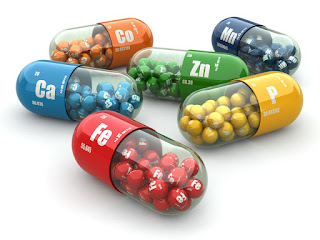Vitamins and Minerals: Too Much of a Good Thing?
For this third entry I am exploring the topic of vitamin and mineral toxicity. Any walk down the aisles of your local pharmacy supplement section yields an enormous array of vitamin and mineral powders, gummies, lozenges, tablets, gel caps, and so on: absolutely any form is available to you for supplementation. Even more baffling, nearly any individual vitamin or mineral can be consumed on its own, independent of any complementary compound (for example, calcium without vitamin D). It has become a cultural norm that when traveling others will advocate using a high-dose Vitamin C powder to ward off infection from airborne illnesses. But what is all this near-megadosing doing to us? Could there be a toxicity concern?
Image source: Harvard Health, 2019.
Fat soluble vitamins are stored in the body’s liver and adipose tissue, and thus higher than recommended doses can be toxic to humans when ingested levels build up over time. (Wooltorton, 2003). The common vitamins A, D, E, and K are all fat soluble and are commonly added to fortified foods, but present toxicity concerns in high doses. Pregnant women must not ingest more than the recommended daily dose of vitamin A, as too much can cause birth defects. (Department of Health & Human Services, 2012). Vitamin A toxicity also can cause damage to the central nervous system, and liver, bone, and skin disorders (Department of Health & Human Services, 2012). Even water-soluble vitamins can be unhealthy in large doses. For example, too much folate can mask a vitamin B12 deficiency. (Department of Health & Human Services, 2012). A correlation has been shown between vitamin B6 toxicity and nerve damage. (Department of Health & Human Services, 2012).
Minerals can be toxic in large amounts as well; if a person were to consume just 5x the recommended daily intake (RDI) of zinc, iron, chromium, or selenium, toxic levels can be reached. (Department of Health & Human Services, 2012). Iron toxicity is a common occurrence and can manifest when even a slightly higher amount is ingested daily than is recommended; mild toxicity symptoms include nausea, stomach upset and abdominal cramping, and black feces. (Department of Health & Human Services, 2012). Severe iron toxicity can render someone comatose, or in extreme cases even cause death. (Department of Health & Human Services, 2012). Large amounts of fluoride can permanently stain and damage teeth, and high doses of fish oil can decrease the body’s blood clotting response. (Department of Health & Human Services, 2012). Doctors truly need all patient supplementation information, no matter how innocuous a vitamin, mineral, or even herb might seem.
Most people who consume the average Western diet are not in danger of being deficient in vitamins and minerals. (Wooltorton, 2003). Healthy adults should instead aim to eat a well-rounded diet rich in fruits, vegetables, and whole grains, rather than relying on vitamin and mineral supplements to make up for all-around poor nutritional habits. If supplements are taken, those that stay close to the recommended daily intake amount for each individual type of vitamin or mineral are best (Wooltorton, 2003), and of course should be taken under the advice and guidance of a physician.
CITATIONS:
Department of Health &
Human Services. “Vitamin and Mineral Supplements.” Better Health Channel,
Department of Health & Human Services, 31 Oct. 2012,
www.betterhealth.vic.gov.au/health/healthyliving/vitamin-and-mineral-supplements.
Harvard Health Publishing.
“The Best Foods for Vitamins and Minerals.” Harvard Health, 6 Feb. 2019,
www.health.harvard.edu/staying-healthy/the-best-foods-for-vitamins-and-minerals.
Wooltorton, Eric. “Too Much
of a Good Thing? Toxic Effects of Vitamin and Mineral Supplements.” CMAJ :
Canadian Medical Association Journal = Journal De L'Association Medicale
Canadienne, U.S. National Library of Medicine, 8 July 2003,
www.ncbi.nlm.nih.gov/pmc/articles/PMC164945/.


Hey Emily! I enjoyed your blog post about if too much of good nutritional source is too much. It was very informative, and I learned a lot from it. This was a very good read! I had no idea that minerals could be so toxic if you took too many of them.
ReplyDeleteHey Emily!! I really enjoyed your post about vitamins and minerals! It was very interesting, and I enjoyed learning a lot more information about why they are incredibly essential for a healthy diet and about why too much can be a problem. I knew that these vitamins and minerals could be severely unhealthy if someone took too many, but I didn't realize that it could have such harmful side effects.
ReplyDelete